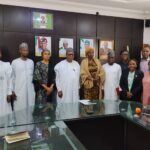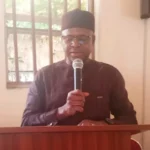By Ijeoma Olorunfemi
Prof. Benjamin Ayatunji, Director, Physical and Life Sciences, National Space Research and Development Agency (NASRDA), says investments in Planetarium infrastructure will position Nigeria on the path of space development.
Ayatunji, in an interview with the News Agency of Nigeria (NAN) on Wednesday in Abuja, described a planetarium as a building with a hemispheric dome used to project images of stars, planets and other celestial objects.
He said developing the planetarium infrastructure could position the country for global relevance in the fast-growing space economy projected to hit one trillion dollars by 2040.
The director said the planetarium remained one of the most strategic but under-utilised tools for developing future astronauts, scientists and space professionals.
He said the value of a planetarium extended beyond stargazing, describing it as a vital national asset for education, innovation and economic growth.
According to him, there are three major types of planetariums, which include fixed, digital and mobile, each with unique potential for education, outreach and commercial applications.
Ayatunji said planetariums play critical roles in astronaut development by providing immersive learning experiences that complement traditional classroom instruction, especially in science, technology, engineering and mathematics (STEM).
“Planetarium infrastructure is a key driver to global space economy which is projected to hit one trillion dollars by 2040.
“The planetarium can offer interactive and immersive experiences that complement traditional classroom instruction, promoting hands-on learning and STEM education.
“Planetariums provide an ideal environment for training and simulation of various space-related scenarios,” he said.
On space tourism, Ayatunji said planetariums helped build public awareness and understanding of the emerging sector, while their advanced simulation technologies could replicate space travel experiences.
“Planetariums can enhance public confidence in commercial space travel through virtual demonstrations, safety simulations and immersive storytelling,” he said.
Speaking on emerging technologies, the NASRDA director, said virtual and augmented realities would revolutionise both planetarium infrastructure and astronaut training.
He added that emerging technologies such as Artificial Intelligence and Robotics would deepen simulation capabilities for space missions and tourism.
Ayatunji also described planetariums as strategic assets for the successful implementation of the National Space Policy and Programme (NSPP).
According to him, they inspire future astronauts, expand STEM participation, and strengthen public interest in space science.
He added that the infrastructure also presented significant economic opportunities for investors, stating that even a mobile planetarium deployed to schools within city centres could become a profitable venture.
“Planetarium infrastructure has a high return on investments. It is a low-hanging fruit for entrepreneurs interested in entering the space ecosystem in Nigeria,” he said.
Ayatunji recommended the establishment of regional state-of-the-art planetariums across the country, integrating planetarium learning into the national education system and fostering public-private partnerships to drive long-term space development.
He emphasised that Nigeria’s journey to becoming a spacefaring nation would be taken seriously with education and public engagement. (NAN)(www.nannews.ng)
Edited by Bashir Rabe Mani












